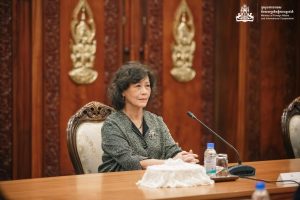Noeleen Heyzer, the special envoy of the United Nations secretary-general to Myanmar, has departed her position after what appeared like no time at all. It appeared that way because, since her appointment in October 2021, little of substance has been accomplished.
Heyzer came into the job with high-ranking credentials, having served as the executive director of UNIFEM, the predecessor to U.N. Women, and for seven years as the executive secretary of the U.N. Economic and Social Commission for Asia and the Pacific (UNESCAP). However, despite her credentials, her experience with military governments was limited compared to past envoys, such as Alvaro de Soto, who was appointed by Secretary-General Kofi Annan in 1997, and brought years of experience in conflict mediation, as well as experience with military governments, particularly El Salvador.
Heyzer found, like many envoys of the past, that the ever-changing political and diplomatic landscapes of a poorly-governed and highly unstable government limited her options. The junta, also known as the State Administration Council (SAC), which came to power in a coup in February 2021, had little tolerance for Heyzer. Nor was it interested in any U.N. involvement or mediation, preferring the controllable chaos of the Association of Southeast Asian Nation (ASEAN)’s Five-Point Consensus, which could easily be stalled.
Instead, her meetings were usually superficial, and often criticized. In August 2022, she was forced to issue statements assuring a troubled Myanmar public that a visit with Senior Gen. Min Aung Hlaing, the stated purpose of which was to ensure the delivery of humanitarian assistance to people in need, did not confer any form of legitimacy on the regime.
But Heyzer was doomed to fail, not because of her own incompetence or lack of experience. The role of the U.N. Special Envoy itself is oddly defined, resulting from a 2017 U.N. General Assembly Resolution that called upon the position to work “in close partnership with all stakeholders” including ASEAN, regional countries and U.N. member states. However, with regard to a specific mandate, the original document is less than specific and arguably does not meet the current requirements of the crisis. Considering that the State Administrative Council (SAC), a formal name for the junta, has rejected all efforts by Heyzer to engage in substantive dialogue, it would be better to redirect efforts toward engaging international actors on humanitarian and human rights grounds, securing needed aid, driving the need for a coordinated international response, and working with neighboring countries to ensure the safe, temporary relocation of displaced persons and refugees, without creating resource challenges for host countries.
As a result, the blame rests less on Heyzer than on the leadership of the U.N., namely Secretary-General Antonio Guterres himself. Even before the fifth special envoy, the Swiss diplomat Christine Schraner Burgener left her post in October 2021, former Secretary-General Ban Ki-moon urged Guterres to get more involved in the country, to “use his good offices to engage directly with the Myanmar military, to prevent an escalation of violence.” Guterres’ office had to quickly put out a statement saying that he was “very actively involved,” and had been “for a long time.” It is also incumbent upon secretaries-general to actively engage with U.N. member states in the region to give the appointed special envoy the credibility and backing that warrants their full attention.
However, Heyzer had her share of self-inflicted wounds. In a news interview shortly after her appointment, she told Channel News Asia that she wanted the people of Myanmar to have “something to live for, not to die for. They need to negotiate what that power-sharing could look like over a long term.” Heyzer then spent weeks in damage control, attempting to reassure worried civil society groups and redirect attention back to ASEAN’s diplomatic efforts.
Heyzer also made ill-fated decisions that were akin to simply running in place. She met with China’s Foreign Minister Qin Gang in May, when he lectured Heyzer about the need to “act prudently and pragmatically to prevent the escalation of the conflict,” while Chinese diplomacy has been pragmatic and self-serving, as evidenced by U.N. Special Rapporteur Tom Andrews’ recent report about governments arming the military regime.
The report described China as a leading supplier of arms to the junta, with 41 suppliers contributing as much as $261 million in arms. Since 2018, the report claimed, Beijing has focused on selling fighter jets to Myanmar, including a $560 million deal for JF-17M “Thunder” fighter jets. China has also sold Myanmar ballistic missile systems with a range capacity of 400 kilometers. Heyzer seeking assurances from China on diplomatic cooperation when the end goal and effect of Beijing’s policies in Myanmar is well known, seems highly misplaced.
In the current environment, where the U.N. prefers to defer to ASEAN on matters of diplomacy, another special envoy should not be named anytime soon. Evidence of this argument can be also seen in the ineffectiveness of recent ASEAN special envoys, where even the politics of selection are complicated. Recall also the efforts of Cambodia’s special envoy, Prak Sokhonn, who wanted to smooth over humanitarian cooperation in meetings in March 2022, but instead was used as a propaganda effort by the junta, which gave the junta a veneer of legitimacy.
Whether it be a lack of experience, a lack of leadership, or even continued paralysis within the U.N. Security Council itself, the time is not right for Guterres to appoint another special envoy to Myanmar. The U.N. must first take a long, hard look at the role – and the role that it wishes to play in the crisis going forward.

































